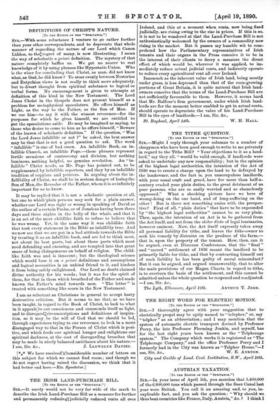DEFINITIONS OF CHRIST'S NATURE.
[To THE EDITOR Or TEE "SPECTATOR.] SIR,—With some reluctance I venture to go rather farther than your other correspondents, and to deprecate that whole
manner of regarding the nature of our Lord which Canon
Liddon, to the: regret of many, is now illustrating. I mean the way of scholastic a priori definition. The mystery of that nature completely baffles us. We get no nearer to real knowledge of it by using phrases like Hypostatic Union. Who is the wiser for concluding that Christ, as man, did not know what, as God, he did know P To steer evenly between Nestorian and Eutychian views is not really to think more adequately, but to divert thought from spiritual substance to logical or verbal forms. No encouragement is given to attempts at definition of this kind in the New Testament. The Lord Jesus Christ in the Gospels does not present himself as a problem for metaphysical speculators. He offers himself as Light, as the way to the Father, as the Son of Man. If we use him—to say it with the utmost reverence—for the purposes for which he gives himself, we are entitled to put the speculations aside. He may be imagined as saying, to those who desire to come to him as be offers himself, "Beware of the leaven of scholastic definition." If the question, "Was the Lord Jesus infallible or not ?" be asked, the best answer may be that that is not a good question to ask. The word "infallible" is one of bad omen. An infallible Book, an in- fallible Church, an infallible Pope,—these phrases represent fertile occasions of controversy and division, but nothing luminous, nothing helpful, no genuine revelation. An "in- fallible" Christ needs, as Mr. Page has pointed out, to be supplemented by infallible reporters, and they by an infallible tradition of copyists and printers. In arguing about the in- fallibility of Christ, we shall be in serious danger of losing the Son of Man, the Revealer of the Father, whom it is so infinitely important for us to know.
It may be replied that it is not a scholastic question at all, but one to whiclfplain persons may seek for a plain answer, whether our Lord was right or wrong in speaking of David as the author of a certain Psalm, or of Jonah as having been three days and three nights in the belly of the whale, and that it is an act of the most childlike faith to refuse to believe that he was wrong. Yet, in the same way it was childlike faith that took every statement in the Bible as infallibly true. And we now see that we are put in a bad attitude towards the Bible by treating it as an infallible book, and are led to think most, not about its best parts, but about those parts which most need defending and excusing, and are tempted into that great snare of being disingenuous on behalf of religion. The child- like faith was and is innocent ; but the theological science which would base it on a priori definitions and assumptions and logical necessities is an unkind friend to it, and hinders it from being safely enlightened. Our Lord no doubt claimed divine authority for his words ; but it was for the spirit of them, for that in them which breathed of the Father and made known the Father's mind towards men. "The letter" is treated with something like scorn in the New Testament.
I am as reluctant as Christians in general to accept hasty destructive criticism. But it seems to me that, as we have been taught, in regard to the Book of Christ, to look to what in it appeals:to our consciences and commends itself as light, and to disregard:circumscriptions and definitions of inspira- tion, so it may, be the will of God that we should be led, through experiences trying to our reverence, to look in a more disengaged way to that in the Person of Christ which is posi- tive, and which feeds our spiritual hunger and enlightens our spiritual darkness, at the cost of disregarding breaches that may be made in nicely balanced antitheses about his nature.—
[I'm,* We have received'a'considerable number of letters on _ .
this eubject for which we cannot find room ; and though we do not regret having raised the discussion, we think that it had better end here.—En. Spectator.]


















































 Previous page
Previous page